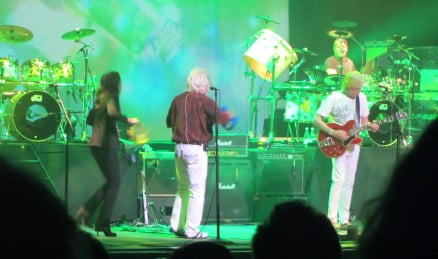On the threshold of a career
I have often been asked about how I got into Engineering. I got a serious reminder of it on 23 November 2011 when I went to see The Moody Blues in concert in St Kilda.
I had started a science degree at Deakin University in Waurn Ponds, Geelong, and stopped after the first year because I realised I didn’t have a good reason for being there. I had always liked science but I had no idea what I wanted to do for a career.
Isn’t life strange
One thing that did happen that year was that a fellow student introduced me to a music group I had never heard of. This was The Moody Blues. I was hooked on the first listen. They sang songs about the meaning of life and communicated with such skill that I wanted to able to do the same. So I took up guitar and started teaching myself how to play.
At the end of that year I decided not to go back for second year of science and took a year off. I worked a couple of mundane jobs, moved from Geelong to South Melbourne and joined a pub band to try my hand at music. We were no comparison to The Moody Blues but something very important happened. I found that I loved working with the equipment and thought it would be really cool to be able to design my own guitar effects, amplifiers and PA equipment. Music Electronics was the career for me.
I had no idea what to study so I went back to Deakin University and asked them. They said that I should do a degree in Electrical Engineering majoring in Electronics. So that is what I did for the next 4 years. This time I had a reason to be there and it showed in my academic results when I graduated with a First Class Honours degree and a grade average of a High Distinction. I also started designing music equipment during my career and even before graduating had equipment installed in recording studies and sold to professional musicians.
So that is how I got started in Electronics and why Analogue Electronics is one of my technical specialties.
Lovely to see you again my friend
So back to the concert.
Wow. The Moody Blues were founded in 1963 and the main line up dates from 1967 where they released the first concept album. That’s right, they beat the Beatles to it. The album was Days of Future Past. Of that line-up, three are still touring: Justin Hayward, John Lodge and Graeme Edge. Graeme Edge turned 70 earlier this year. And they still rock. That’s what finding the right career does for you. Passion and perseverance for the long haul. It is one of the best concerts I have ever been to.
And again I am grateful for the inspiration they were to me and for the career in Electronics that came from that.
Some of you may have noticed that the headings are all based on albums or songs by The Moody Blues.
New Horizons
I still play guitar and now also produce music. So as an example, here is a piece I recently produced trying to capture the journey from uncertainty into hope using music only. It is titled “Finding Hope“. Enjoy.
Finding Hope – © Ray Keefe Right click to save or click to listen in the browser.
Successful Endeavours specialise in Electronics Design and Embedded Software Development. Ray Keefe has developed market leading electronics products in Australia for nearly 30 years. This post is Copyright © 2011 Successful Endeavours Pty Ltd






